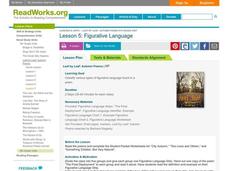Spelling City
Card Flip Game: Synonyms and Antonyms
Match words to their synonyms and antonyms with a card flip game. Kids turn over two cards on their turn and determine if they are synonyms or antonyms; if not, they replace the cards and try again.
All About Reading
Pirate Dictionary
Shiver me timbers, this here resource is a great way to teach young landlubbers to speak the language of the briny deep. Including over 30 different words and phrases, complete with definitions and guide words, this dictionary will have...
Education Center
Penguin Puzzlers
Test your pupils' ability with analogies with a cute activity featuring penguins. Learners complete each penguin-related analogy by circling the best choice to complete each one. They then take the letters they circled and move them...
Southern Illinois University
I Can Write a Poem
It is so important for English language learners to be able to write for a variety of purposes. Specifically written for an ELD class, this activity provides explicit instruction for teaching learners how to write a poem. First, they...
Curated OER
Where the Red Fern Grows Chapter 1 Worksheet
Break down Where the Red Fern Grows by Wilson Rawls into manageable chunks by focusing on plot points and literary elements in specific chapters. This resource is all about the first chapter, and asks pupils to use complete sentences to...
McGraw Hill
Study Guide for Island of the Blue Dolphins
Dive your class into a reading of Island of the Blue Dolphins with this in-depth study guide. Breaking the novel into three parts, the resource begins each section with a focus activity that identifies a specific theme or question to be...
Curated OER
Genre Lesson: Poetry
Here is a terrific lesson on poetry! Learners bring in the lyrics to their favorite song. A class discussion ensues regarding what makes a song "catchy." After analyzing the alliteration of the poems, learners read the poem "This...
Curated OER
Silly Spoonerisms!
Looking for a fun activity for your vocabulary lesson? Bring a activity on "spoonerisms" to your fifth grade class. Kids decipher seven phrases that have mixed up the first letter sounds of each word. They then think of their own...
Curated OER
Homophones and Homographs
Getting tired of correcting to, two, and too? What about weather and whether? Use a thorough lesson on homophones and homographs to clear up those differences. Fourth and fifth graders identify which words sound the same and are spelled...
Curated OER
Malapropisms
What's the difference between an allegory and an alligator? Fifth graders work with malapropisms to determine the meanings of words that sound alike. Five sentences challenge them to find the malapropism and change it to the correct...
Curated OER
Homophones: Fun with Puns
What is a homophone for aloud? Or right? Fifth graders complete a list of 24 homophones, choosing another word that sounds like a given word but has a different meaning. At the bottom of the page, they write punning sentences to practice...
Read Works
Figurative Language
Do your learners need to practice identifying figurative language? This activity outlines a method for working on that tricky skill. After teacher modeling and think-aloud, fourth and fifth graders identify examples of figurative...
Curated OER
Idioms
Use this podcast lesson plan to familiarize scholars with the characteristics, history, and cultural implications of idioms. As part of the Walking Classroom curriculum, kids listen to a 12-minute podcast as they walk around campus. If...
Curated OER
Ye Olde English Sayings
Discover the historical roots of modern English with your young learners, and then discover the meaning of many old English sayings. What a great chance to explore the history behind many of the words and phrases we use today!
Curated OER
Genre Lesson: Poetry
Hook kids into a study on poetry elements by asking them to bring in the lyrics to their favorite song. Discuss the elements in one or two songs (preferably that demonstrate rhyme, figurative language, or a repeating phrase). Groups do...
Curated OER
Metaphors
Metaphors open doors to descriptive language for your poets. They read the poem "What is the Sun" and record all the metaphors they find. Then, scholars change one of them to a simile. After answering two more comprehension questions,...
Curated OER
Similes
Similes are a great way to get your writers thinking about descriptive details. They read a brief explanation which covers clichés and the general wording of a simile. Then, learners try a few on their own. First, they complete nine...
Curated OER
Reading a Classic Novel
Charles Dickens offers an excellent example of sensory writing in this reading comprehension worksheet. Learners read excerpts from the novel Hard Times in which he describes the New England industrial city of Coketown. They consider why...
Curated OER
The Daily Idiom
What is an idiom? Learners identify and read common idioms. They discuss what idioms are, and are given a black line master embedded in the plan that has 100 common idioms. Next, they complete "The Daily Idiom" worksheet, which is...
K12 Reader
Choose the Correct Homophone
It's a known secret that English can be a difficult language to learn, and homophones don't make it any easier. Help your young readers tackle these tricky words with this simple fill-in-the blank exercise in which they identify the word...
K12 Reader
Fix the Story with Antonyms
Readers correct a paragraph, providing antonyms for words printed in bold print so that the paragraph makes sense.
K12 Reader
Identify the Synonym
Readers are asked to select the correct synonym for the underlined words on this 10 sentence, multiple choice worksheet.
K12 Reader
Adjective Antonyms
Easy or hard? Fast or slow? Invite your class members to practice with antonyms. They identify each adjective and then use provided antonyms to rewrite the sentences.
Mailbox Education Center
On the Hunt: Understanding Figurative Language
Young writers hunt for examples of figurative language in their reading. The hunt requires pupils to cite their sources, record a quoted example for each type of figurative language, and an explanation of what they think the examples...

























